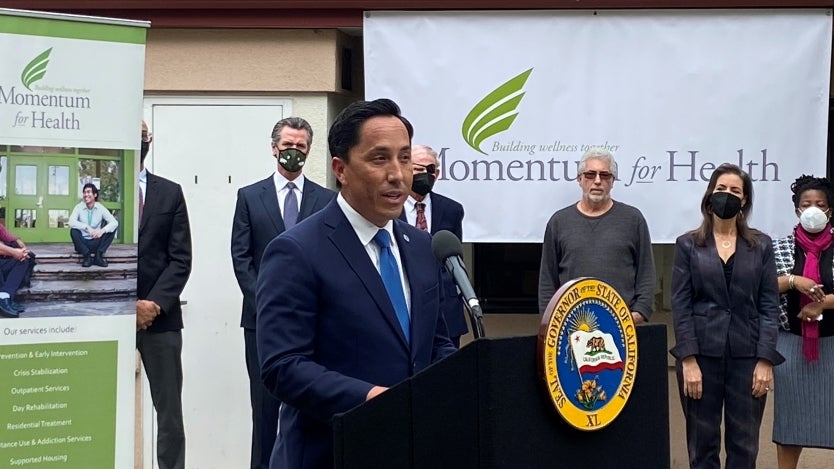MAYOR WILL HELP LEAD COALITION TO IMPLEMENT NEW CARE COURT PROPOSAL
FOR IMMEDIATE RELEASE
Tuesday, March 3, 2022
CONTACT:
MayorPress@sandiego.gov
SAN DIEGO As part of his efforts to prioritize connecting unsheltered residents with behavioral health needs to treatment, Mayor Todd Gloria today joined Gov. Gavin Newsom and other state leaders to announce CARE Court -- a new policy framework designed to assist people living with untreated mental health and substance abuse challenges.
CARE (Community Assistance, Recovery and Empowerment) Court would provide a new tool for local governments to help those that suffer from psychotic episodes gain access to behavioral health services and housing through a court-ordered care plan for up to 24 months. The courts would require counties to provide the services for individuals deemed eligible, and plans would be managed by a community-based care team that would ensure program participants avail themselves of needed mental health care, supportive services, medication and housing. In addition to a clinical team, individuals in CARE Court would have a public defender and care manager to help them make self-directed care decisions.
Its time we face the painful but obvious truth: Our behavioral health system in California is broken. All of us see it every day on our streets, and its long past time we fix it, said Mayor Gloria. Governor Newsoms CARE Court proposal is a major step forward. It will provide individuals who are struggling with behavioral health issues a pathway to the housing and health services they need and give those who encounter these individuals a real way to provide help. I look forward to working with the Governor and my municipal colleagues to implement a working program at the local level.
In his State of the City in January, Mayor Gloria committed to working on reform of conservatorships to compel treatment for the growing number of vulnerable mentally ill people incapable of caring for themselves or accessing a pathway out of homelessness.
CARE Court is less restrictive than conservatorships and could apply to a broader population of people experiencing homelessness. Tools like Lauras Law and conservatorship, respectively, serve roughly 200 and 5,000 people statewide. CARE Court will serve people who do not meet thresholds for those more serious interventions, connecting them to care at an earlier stage. The proposal is based on evidence that many people can stabilize, begin healing and exit homelessness in less restrictive, community-based settings. The plan focuses on people with schizophrenia spectrum and other psychotic disorders, who may also have substance use challenges and who lack medical decision-making capacity. Its designed to divert these individuals from more restrictive conservatorships or incarceration.
CARE Court is about meeting people where they are and acting with compassion to support the thousands of Californians living on our streets with severe mental health and substance use disorders, said Governor Newsom. We are taking action to break the pattern that leaves people without hope and cycling repeatedly through homelessness and incarceration. This is a new approach to stabilize people with the hardest-to-treat behavioral health conditions.
Mayor Gloria will play a key role in developing policy details and advocating for implementing legislation for the program. Once approved, the Mayor will ensure CARE Court is put into practice locally to aid the hundreds of people on San Diegos streets whose untreated behavioral health disorders prevent them from improving their circumstances.
Under the proposal, the court-ordered response could be initiated by family, county and community-based social services, behavioral health providers or first responders. Individuals exiting a short-term involuntary hospital hold or arrest would be especially good candidates for CARE Court.
The Care Plan could be ordered for up to 12 months, with periodic review hearings and subsequent renewal for up to an additional year. Participants who do not successfully complete Care Plans may be hospitalized or referred to conservatorship with a new presumption that no suitable alternatives to conservatorship are available.
Counties across the state will participate in CARE Court under the proposal. Local governments that do not carry out their specified duties under court-ordered Care Plans could be sanctioned by courts or have an agent appointed to ensure services are provided.
CARE Court builds on Governor Newsoms $14 billion, multi-year investment to provide 55,000 new housing units and treatment slots as well as a more than $10 billion annual investment in community behavioral health services.
###



